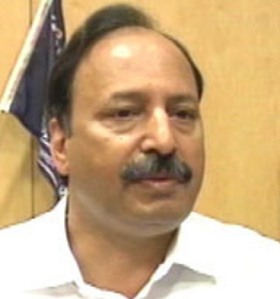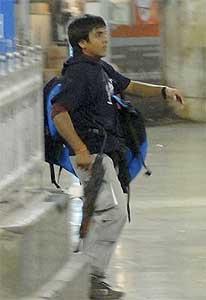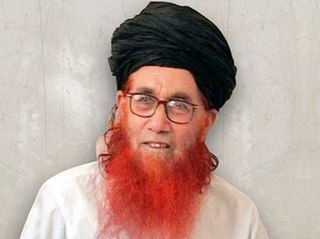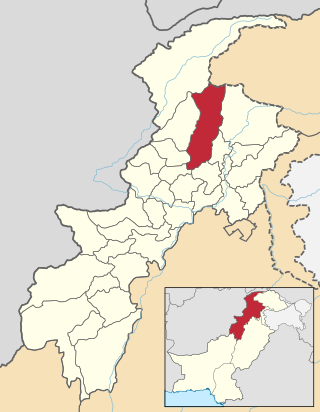Related Research Articles

Swat District is a district in the Malakand Division of Khyber Pakhtunkhwa, Pakistan. With a population of 2,309,570 per the 2017 national census, Swat is the 15th-largest district of Khyber Pakhtunkhwa province.

The insurgency in Khyber Pakhtunkhwa, also known as the War in North-West Pakistan or Pakistan's war on terror, is an ongoing armed conflict involving Pakistan, and Islamist militant groups such as the Tehrik-i-Taliban Pakistan (TTP), Jundallah, Lashkar-e-Islam (LeI), TNSM, al-Qaeda, and their Central Asian allies such as the ISIL–Khorasan (ISIL), Islamic Movement of Uzbekistan, East Turkistan Movement, Emirate of Caucasus, and elements of organized crime. Formerly a war, it is now a low-level insurgency as of 2017.
Fazal Hayat, more commonly known by his pseudonym Mullah Fazlullah, was an Islamist militant who was the leader of the Tehreek-e-Nafaz-e-Shariat-e-Mohammadi, and was the leader of the Tehreek-e-Taliban Pakistan in Swat Valley. On 7 November 2013, he became the emir of the Tehrik-i-Taliban Pakistan, and presided over the descent of the group into factions who are often at war with each other. Fazlullah was designated by the Al-Qaida and Taliban Sanctions Committee of the Security Council in 2015, and was added to the U.S. State Department's Rewards for Justice wanted list on 7 March 2018. Fazlullah was killed in a U.S. drone strike in Kunar, Afghanistan on 14 June 2018.

The Pakistani Taliban, formally called the Tehreek-e-Taliban-e-Pakistan, is an umbrella organization of various Islamist armed militant groups operating along the Afghan–Pakistani border. Formed in 2007 by Baitullah Mehsud, its current leader is Noor Wali Mehsud, who has publicly pledged allegiance to the Afghan Taliban. The Pakistani Taliban share a common ideology with the Afghan Taliban and have assisted them in the 2001–2021 war, but the two groups have separate operation and command structures.

The 2008 Mumbai attacks were a series of terrorist attacks that took place in November 2008, when 10 members of Lashkar-e-Taiba, an Islamist terrorist organisation from Pakistan, carried out 12 coordinated shooting and bombing attacks lasting four days across Mumbai. The attacks, which drew widespread global condemnation, began on Wednesday 26 November and lasted until Saturday 29 November 2008. A total of 175 people died, including nine attackers, and more than 300 were wounded.

Hemant Karkare was the chief of the Mumbai Anti-Terrorist Squad (ATS). He was killed in action during the 2008 Mumbai attacks. In 2009, he was posthumously given the Ashoka Chakra, India's highest peacetime gallantry decoration.
Attribution of the 2008 Mumbai attacks were first made by the Indian authorities who said that the Mumbai attacks were directed by Lashkar-e-Taiba militants inside Pakistan. American intelligence agencies also agree with this attribution. Pakistan initially contested this attribution, but agreed this was the case on 7 January 2009. To back up its accusations, the Indian government supplied a dossier to Pakistan's high commission in Delhi. The Pakistan government dismissed the dossier as "not evidence," but also announced that it had detained over a hundred members of Jamaat-ud-Dawa, a charity linked with Lashkar-e-Taiba. In February 2009, Pakistan's Interior Minister Rehman Malik agreed that "some part of the conspiracy" did take place in Pakistan.

Mohammed Ajmal Amir Kasab was a Pakistani terrorist and a member of the Islamic terrorist organization Lashkar-e-Taiba through which he took part in the 2008 Mumbai terrorist attacks in Maharashtra, India. Kasab, alongside fellow Lashkar-e-Taiba recruit Ismail Khan, killed 72 people during the attacks, most of them at the Chhatrapati Shivaji Terminus. Kasab was the only attacker captured alive by police.
Zakiur Rehman Lakhvi is a Pakistani terrorist and co-founder of Lashkar-e-Taiba. One of the prime perpetrators in the 2008 Mumbai Attacks, he features on India's NIA Most Wanted list. In January 2021, he was arrested by Pakistani authorities and sentenced to three concurrent five-year sentences in jail for terror financing in an unrelated case.

Tukaram Omble AC was an Indian police officer and a former member of Indian army who served as an assistant sub-inspector (ASI) of the Mumbai Police. He was killed in action during the 2008 Mumbai attacks, at Girgaum Chowpatty in Mumbai. The Indian government posthumously honoured Omble on 26 January 2009 with the Ashoka Chakra, the country's highest peacetime military award.

Tehreek-e-Nafaz-e-Shariat-e-Mohammadi is a Islamic extremist militant group that follows the Salafi & Wahhabi doctrines of Sunni Islam. The group swore an oath of loyalty to Baitullah Mehsud, the founder & leader of the Pakistani Taliban and become the part of Pakistani Taliban aftermath the siege of Lal Masjid in 2007. The group's stated objective is to enforce Sharia law in Pakistan.

Sufi Muhammad bin Alhazrat Hassan was a Pakistani Sunni Salafi Islamist cleric and militant, the founder of Tehreek-e-Nafaz-e-Shariat-e-Mohammadi (TNSM), a militant group vying for implementation of Sharia in Pakistan. It operates mainly in the Dir region, Swat, and Malakand districts of Khyber-Pakhtunkhwa. Sufi Muhammad was jailed for sending thousands of volunteers to Afghanistan to fight the U.S. intervention in 2001. However, he was freed in 2008 after he renounced violence. He was the father-in-law of Maulana Fazlullah, who assumed the leadership of TNSM during Sufi's imprisonment. He was described by BBC as a "follower" of Saudi Arabia's Wahhabi Islamic school of thought, and by the Jamestown Foundation as one of the "active leaders" of Jamaat-e-Islami in the 1980s.

Operation Black Thunderstorm was an aggressive military operation that commenced on April 26, 2009, conducted by the Pakistan Army, with the aim of retaking Buner, Lower Dir, Swat and Shangla districts from the Tehrik-i-Taliban Pakistan after the militants took control of them since the start of the year.

The Second Battle of Swat also known as Operation Rah-e-Rast, began in May 2009 and involved the Pakistan Army and Tehrik-i-Taliban Pakistan militants in a fight for control of the Swat district of Pakistan. The first Battle of Swat had ended with a peace agreement, that the government had signed with the Tehrik-i-Taliban Pakistan in February 2009. However, by late April 2009 government troops and the Tehrik-i-Taliban Pakistan began to clash once again, and in May the government launched military operations throughout the district and elsewhere to oppose the Tehrik-i-Taliban Pakistan.
Muslim Khan is a Pakistani militant and former spokesman for the Tehrik-i-Taliban Pakistan chapter based in Swat.

Malala Yousafzai is a Pakistani female education activist and the 2014 Nobel Peace Prize laureate. Awarded when she was 17, she is the world's youngest Nobel Prize laureate, and the second Pakistani and the first Pashtun to receive a Nobel Prize. She is known for human rights advocacy, especially the education of women and children in her native homeland, Swat, where the Pakistani Taliban had at times banned girls from attending school. Her advocacy has grown into an international movement, and according to former Prime Minister Shahid Khaqan Abbasi, she has become Pakistan's "most prominent citizen."
Abbas Kazmi is a criminal lawyer who received wide media coverage for representing Ajmal Kasab, the prime accused in the 26/11 Mumbai terror attacks. He was a participant in Bigg Boss.

Yerwada Central Jail is a noted high-security prison in Yerwada, Pune in Maharashtra. This is the largest prison in the state of Maharashtra, and also one of the largest prisons in South Asia, housing over 5,000 prisoners (2017) spread over various barracks and security zones, besides an open jail just outside its premises. Many well known nationalist fighters individuals including Mahatma Gandhi and Jawaharlal Nehru have been jailed here.
Maulana Shah Dauran was an Islamist militant from Swat, Pakistan. He was a deputy of Fazlullah, the chief of the Pakistani Taliban in Swat. He was one of the most wanted militants and the closest aide of Swat Taliban chief Maulana Fazlullah. He was known for his hawkish views against the opponents. The government of Khyber Pakhtunkhwa announced a 10 million rupees bounty on Dauran.
The Pakistan Armed Forces have been criticized for eroding democratic processes in Pakistan, for being the largest business conglomeration in the country and for excessive control over the domestic and foreign policies of Pakistan. Critics of the Pakistan Army, such as human rights activist Manzoor Pashteen, have been jailed while like-minded Pakistani citizens are warned against criticizing the military establishment. In Pakistan, the military is considered a part of what is known as The Establishment; they control the state through a backdoor and are a part of a working deep state.
References
- ↑ "Official Butcher of Swat Taliban Dies? - Pakistani Military & Strategic Discussion Forum - Pakistani Defence Forum". Archived from the original on 14 July 2014. Retrieved 11 July 2014.
- ↑ "Ajmal isn't the only notorious Kasab from Pak". The Indian Express. 28 September 2009. Retrieved 29 February 2020.